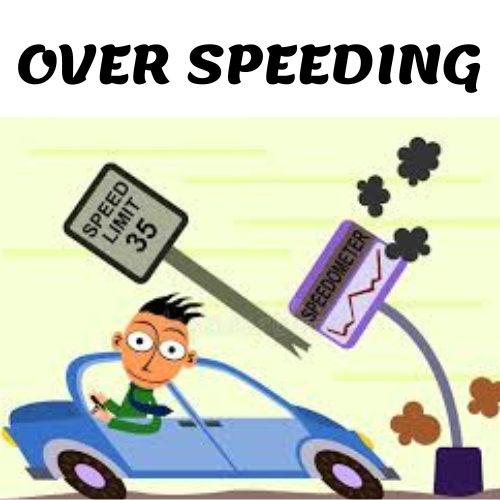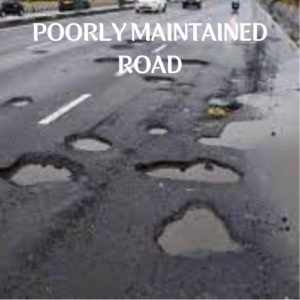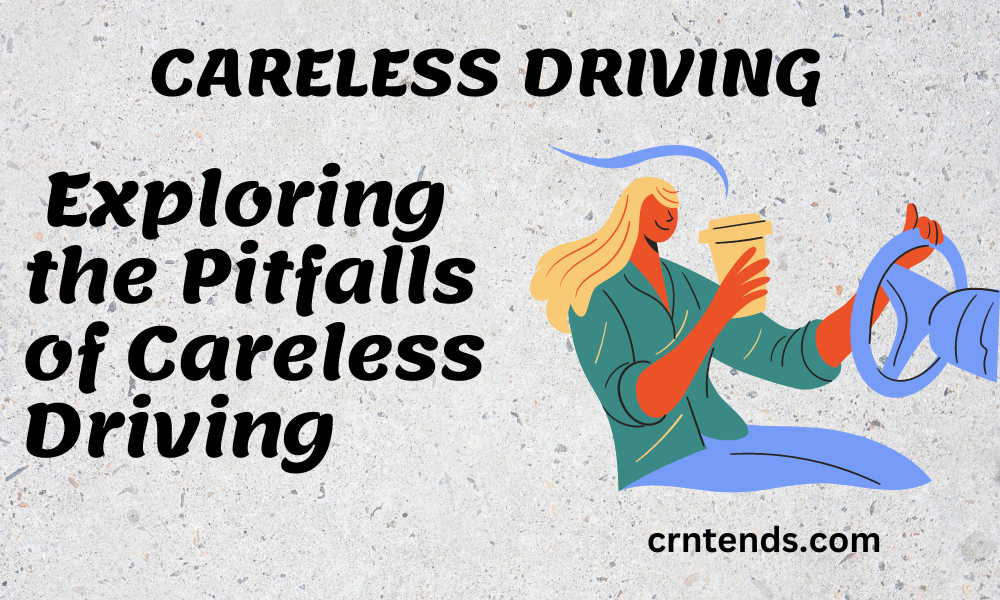In the hustle and bustle of modern life, it’s easy to overlook the importance of responsible driving. However, the repercussions of careless driving extend far beyond mere inconvenience or frustration. Each year, countless lives are shattered, families torn apart, and communities left reeling from the devastating effects of reckless behavior behind the wheel. In this blog post, we delve into the harmful effects of careless driving, shedding light on the grave consequences it brings to individuals and society as a whole.
What is Careless Driving
Careless driving refers to operating a vehicle in a negligent or reckless manner, often without proper regard for the safety of oneself or others on the road. It encompasses a wide range of behaviors, including speeding, distracted driving, aggressive maneuvers, and failing to follow traffic laws or signals. Essentially, careless driving involves actions that increase the risk of accidents or collisions due to a lack of attention, consideration, or responsibility behind the wheel. This can include anything from texting while driving to disregarding right-of-way rules or driving under the influence of drugs or alcohol. Careless driving poses a significant threat to road safety and can result in property damage, injuries, or even fatalities.
Harmful Effects of Careless Driving
Table of Contents

Loss of Life and Injury
Careless driving is a leading cause of fatal accidents worldwide. From speeding and reckless overtaking to distracted driving and driving under the influence, the roads are rife with perilous behaviors that endanger lives. Every day, individuals pay the ultimate price for these reckless actions, leaving behind grieving families and shattered communities. Moreover, even those who survive such accidents often suffer life-altering injuries, enduring physical pain, emotional trauma, and financial burden for years to come.
Emotional Toll
Beyond the physical harm caused by careless driving, there’s a profound emotional toll on victims and their loved ones. The sudden loss of a family member or friend in a preventable accident leaves a void that can never be filled. The anguish, grief, and trauma experienced by survivors and those left behind are immeasurable, permeating every aspect of their lives and haunting them long after the accident has faded from the headlines.
Long Term Effects on Quality Of Life
For survivors of serious traffic accidents, the long-term effects on their quality of life can be profound. Chronic pain, disability, and limited mobility can impair their ability to work, socialize, and engage in everyday activities, robbing them of independence and autonomy. Moreover, the financial strain of ongoing medical treatment, rehabilitation, and caregiving can place additional burdens on individuals and their families, perpetuating a cycle of hardship and adversity.
Legal Ramifications

Careless driving often carries legal consequences for those responsible, including fines, license suspensions, and even imprisonment in cases of severe negligence or repeat offenses. Legal proceedings can be lengthy, costly, and emotionally draining for all parties involved, further compounding the trauma of the accident. Additionally, civil lawsuits filed by victims or their families seeking compensation for damages can result in financial ruin for the at-fault driver and their insurers.
Financial Burden
Reckless driving doesn’t just cost lives; it also carries a hefty financial burden. Medical expenses for treating injuries, rehabilitation costs, legal fees, and property damage add up quickly, imposing financial strain on individuals, families, and society at large. Moreover, lost productivity due to injuries or fatalities further exacerbates the economic toll of reckless driving.
Societal Trust and Confidence
Repeated incidents of reckless driving erode trust and confidence in the safety of roadways and the competence of fellow drivers. Fear of encountering reckless drivers on the road can lead to heightened anxiety and stress among motorists, pedestrians, and cyclists. This loss of trust in the driving community can hinder cooperation and communication on the roads, further increasing the risk of accidents and injuries.
Strain on Emergency Services
Careless driving places an immense strain on emergency services, including paramedics, firefighters, and law enforcement agencies. Responding to traffic accidents requires significant resources, including personnel, equipment, and vehicles, diverting attention and resources away from other critical emergencies. Moreover, the emotional toll of witnessing and responding to traumatic incidents can take a toll on the mental health and well-being of first responders.
Causes Of Careless Driving
Careless driving is a prevalent issue on roads worldwide, leading to accidents, injuries, and even fatalities. While it’s easy to blame individual drivers for their negligence, the root causes of careless driving often run deeper, stemming from various factors that influence human behavior behind the wheel.
The significant cause of careless driving are
Distraction

In today’s fast-paced world, we’re constantly bombarded with stimuli, from smartphones buzzing with notifications to passengers engaging in conversation. These distractions divert our attention away from the road, impairing our ability to react swiftly to changing traffic conditions. Even a momentary lapse in concentration can have disastrous consequences.
Over speeding

One of the leading causes of careless driving is overspeeding. When drivers exceed the speed limits, they significantly reduce their reaction time and ability to control their vehicles. Often, the thrill of speed clouds judgment, leading to reckless maneuvers and an increased risk of accidents. Whether it’s rushing to reach a destination or simply enjoying the adrenaline rush, many drivers fail to recognize the dangers associated with driving at excessive speeds.
Unsafe Overtaking
Impatience often drives drivers to engage in unsafe overtaking maneuvers, endangering themselves and others on the road. Whether it’s attempting to pass a slower vehicle on a narrow road or overtaking in adverse weather conditions, such reckless behavior can have catastrophic consequences. Failure to assess the traffic situation properly or misjudging the distance between vehicles can result in head-on collisions or sideswiping accidents, highlighting the importance of patience and caution while overtaking.
Fatigue
Another common culprit is fatigue. Whether it’s due to long hours at work, inadequate sleep, or monotonous stretches of road, fatigue can impair cognitive functions and slow reaction times. Drivers who are tired are more prone to drifting off, missing important signs and signals, and making poor judgment calls behind the wheel.
Impatience
In today’s society, where instant gratification is the norm, many drivers feel a sense of urgency to reach their destination quickly. This impatience can lead to aggressive driving behaviors such as tailgating, weaving in and out of traffic, and disregarding traffic laws—all of which increase the risk of accidents
Inexperience
Inexperience also plays a significant role in careless driving. Young drivers, in particular, may lack the skills and judgment necessary to navigate challenging driving situations safely. Without proper training and experience, they may underestimate risks, overestimate their abilities, and fail to anticipate potential hazards on the road
Poorly maintained road

The condition of the road plays a significant role in promoting or deterring safe driving practices. Potholes, uneven surfaces, and inadequate signage contribute to driver confusion and frustration, leading to erratic behavior behind the wheel. Moreover, poorly maintained roads can damage vehicles and increase the likelihood of accidents. Drivers may swerve unexpectedly or lose control of their vehicles when navigating through these hazardous road conditions, further exacerbating the risk of collisions.
Weather Conditions
Adverse weather conditions pose significant challenges for drivers, testing their skills and judgment on the road. Rain, snow, fog, and ice create slippery surfaces and reduced visibility, making it harder to maintain control of vehicles. Despite these hazards, many drivers fail to adjust their driving behavior accordingly, continuing to drive at high speeds or neglecting to use appropriate safety measures such as headlights or windshield wipers. This lack of adaptability increases the likelihood of accidents and underscores the need for drivers to exercise caution in inclement weather.
Unexpected Obstacle
The presence of unexpected obstacles on the road can catch drivers off guard, triggering panic reactions and impulsive decisions. Whether it’s a stray animal, debris, or a sudden obstruction, drivers must react swiftly and decisively to avoid accidents. However, in moments of distress, some drivers may resort to abrupt maneuvers or slamming on the brakes, exacerbating the situation and potentially causing collisions. Maintaining attentiveness and composure in the face of unexpected obstacles is essential for preventing accidents and ensuring the safety of all road users.
